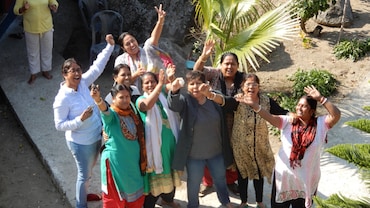- HOME
- /
- Features
- /
- Current Affairs
- /
How A Passive Onlooker Stepped In To Flag Domestic Violence
Don’t Be a Bystander. With a small intervention, you can save the life of someone putting up with domestic violence
 Photo: Shutterstock
Photo: Shutterstock
Soon after we were married in early 2011, we moved to a new flat in northeast Delhi's Dilshad Garden. Sarbani and I had just about started out, and picked a neighbourhood where housing was easily affordable. The area had flats cheek-by-jowl, stacked like little cardboard boxes. Neighbours' doors banged against each other, opened at the same time. Know what I mean?
But, we did not mind it at all—it was a cosy little place, with friendly neighbours and almost everything was within reach—even the Metro station. As we settled in, we realized within a few weeks that there was a problem with the house. More precisely, the problem was with a flat two houses away from our ground-floor apartment.
Every once in a while, we would hear shouting matches between a couple, followed by screams that one could only come out of physical violence. It was also clear that the woman was being assaulted on a regular basis. The fights normally started with insults being hurled at each other in Punjabi and Hindi, but inevitably they escalated into physical violence. It was a regular feature through the week, but intensified during the weekends.
The violence probably lasted for a few minutes, but to me, it seemed like hours. Whenever it came on, I shut the doors and windows, turned up the volume of my television and hoped this terrible situation could be blocked out. But, it was a losing battle. Every slur, insult, thud and kick, somehow amplified manifold and found their way into our home. The thought of an abusive man unleashing his rage on a defenceless woman made me feel sick to the pit of my stomach. I imagined their only child, a boy of ten or 11, cowering in one corner of his house as he watched these scenes.
Our next-door neighbours whispered details about that family. The couple was financially sound and owned the flat, the lady was a teacher and that the man had a small business. What was the problem then?
I had read that domestic violence could be the result of many complex issues. In our neighbour's case, alcoholism was certainly the obvious one. I had seen the man a few times: He was reed-thin, unkempt and hardly interacted with anybody. Looking at him, no one could imagine that he could wreak such havoc once he was within his home. He almost looked timid.
We often wondered why the lady put up with the violence. It remained an abiding mystery, as she came through as somebody who would not take things lying down. At least that's what it seemed like, whenever she interacted with neighbours.
Sarbani and I avoided discussing this issue, as there was really nothing we could do except to feel terrible about the whole thing. Or, so we thought. Months passed by this way.
One day, around dinner time, when I was alone at home, I heard suddenly heard loud screams emanating from that house. Things were being thrown about and the kicking and pounding had started. I had been listening to them for a few months now, and the anger I felt every time it happened had been swelling within me.
I could not take it any more. In the spur of the moment, I rushed out of my home, plucked a bill that was tucked in a letter-box next to the staircase and rang their bell. The screams suddenly fell silent, and within a few seconds, the man opened their wooden door. He saw me standing in front with the grille separating us. Without unlocking it, he continued to stare at me. I waived the bill at him and asked—no, mumbled—if it was theirs. “No, it isn’t!” he rudely spat back and shut the door with a bang.
I knew I had acted on impulse. But, as I returned home and reflected on what I had done, I realized that I may have been inspired by the 'Bell Bajao' campaign that was running on TV at that time. These ads talked of how small gestures from neighbours towards domestic violence victims could go a long way in putting an end to it, at least momentarily. I may never have thought about it, but for some subconscious part of me pushing me towards the door of that house, looking for a weak excuse to ring the bell.
There was silence from behind those doors after I returned home that night. I kind of felt good about myself, that I did not remain the passive bystander, that I had been all these months, and let the violence go on. And, that my stepping in might have made a small difference.
Unfortunately, the peace did not last for long, and the reedy man was back to being his old self. I intervened again, with some other excuse, just once more, but never after that.
As time passed, we could see the little boy, who was now an adolescent, had started speaking up for his mother, taking charge of the situation in his home. After staying in the area for the next five years, we moved out, and until today, I have no idea what happened to them.
---
Earlier this week, reading about a wave of domestic violence under lockdown, in India and all over the world, it all came back to me, raw and hurting.
I dug deeper and found out that Bell Bajao ('Ring the Bell') was a campaign launched by 'Breakthrough,' an organization that works with the victims of domestic violence. The campaign encouraged ordinary people (like me) to take a stand against physical abuse through simple acts meant to interrupt domestic violence.
The goal was for it to act as a warning to the abuser, the organization believes. I may have pushed back the abuser to some extent, but far more important was something else. My little gesture may have comforted the victim/survivor, and even sent a message to her that help is available, should she need it. Moreover, perhaps it let the abuser know that his neighbours were listening, and could intervene—anytime.
I got in touch with Breakthrough yesterday and asked them if you and I could intervene if domestic violence was taking place around us at this time. I am glad I did, as I learnt many things I did not know then. We need not be bystanders you know, it’s important we step up and stop this madness: Even if it is by ringing a bell with a vague excuse.
Here are some tips from Breakthrough for bystander interventions:
# Don’t assume homes are safe spaces for everyone.
# Text/Call if you know someone who is in an abusive relationship. Texting can be better since calling might alert the abuser.
# Just listen to survivors and let them tell you what they want.
# Share resources and helpline numbers as often as you can, especially with women and girls you think need it.
# If you hear or see anything that indicates domestic violence don’t ignore.
# If possible you can disrupt by ringing the bell. You can also report to 1091 and other helpline numbers.






